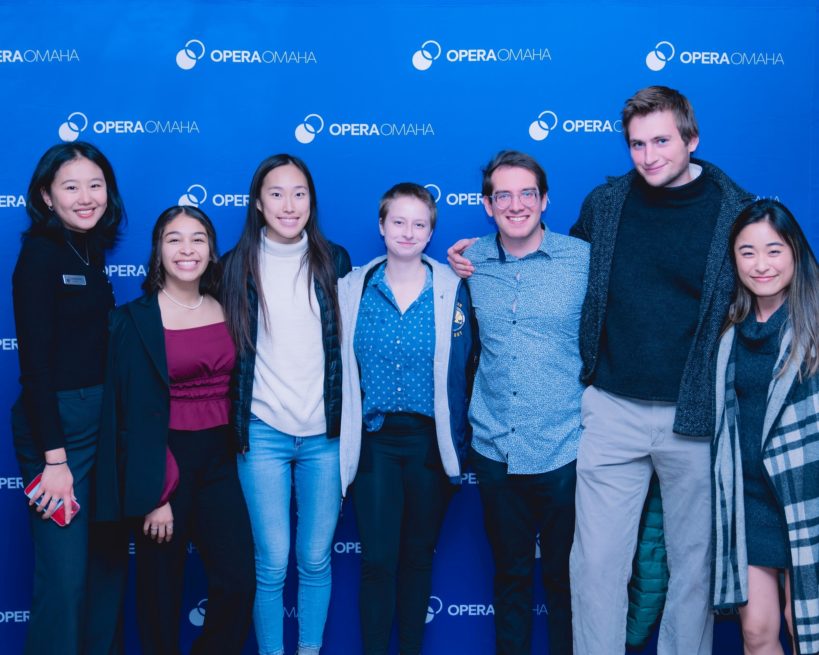
Crystal Fuller is leading a suicide prevention training. She is standing in front of a projector, presenting to a classroom of attendees from various nonprofit organizations.
Education | May 23, 2023
Weitz Insights
Seven Weitz Fellows are smiling at the camera and standing in front of a blue Opera Omaha backdrop.
Carleton Weitz Fellows | May 9, 2023
This is a guest blog by one of our Weitz Fellows, Rebecca Chen. This blog is estimated to take 3 minutes to read.
Hello! My name is Rebecca Chen (she/her) and I’m the current Weitz Fellow at Opera Omaha. The past eight months have been a whirlwind transitioning out of college, and I’m still wrapping my head around the fact that new Fellows are coming to visit to start their terms soon!
Music has played quite an important role in my life since childhood. My dad would put on classical cassette tapes during car rides, from The Blue Danube to Rachmaninoff’s 2nd Piano Concerto. I started piano when I was five years old and choir since first grade. However, it was not until college that I found a supportive and collaborative music community. I had a lot of fun playing piano duets/eight-hands and singing in chamber groups, including the first acapella that focuses on non-English repertoire at Carleton that my friends and I started senior year. Seeing how music can bring people together despite many personal differences led me to my Fellowship with Opera Omaha.
My day-to-day work at the Opera looks quite different depending on the projects I’m involved in. For instance, I could be emailing teachers and students about our Music & Poetry Project, which is a program that connects student poets with composers to create original music. Additionally, I might be conducting research and analyzing data on the socioeconomic demographics of our partner organizations, giving a prelude talk about the Met Opera broadcast of Der Rosenkavalier, or working backstage for our spring production The Marriage of Figaro. A highlight of my fellowship has been working on the Green Office Initiative, a long-term, cross-departmental project that I started because I wanted to make changes in our office space and combine my interest in sustainability with our daily operations. Over the past few months, I implemented a recycling program, built an onboarding website, and composed sustainability newsletters for the staff.
Opera at its core is about collaboration. There are a lot of different elements that go into the production: singing, theater, choreography, orchestra, set design, light design, stage management, and more. There are also many thoughts and deliberations that go beyond the production: what’s our approach to casting and repertoire selection? How do we serve our community better? How do we approach innovation and transformation in the opera and the classical music field in general? How can we change the perception of opera and classical music and make this art form more accessible and equitable? It is exciting to be at the intersection where we are asking such questions, attempting to answer them, and most importantly, implementing the change we want to see in the field. I found Opera Omaha uniquely positioned with a strong connection with our local communities.
I have been shadowing workshops that our Holland Community Opera Fellows create and lead every week at our local community partners. The Fellows bring their artistic talents and resources to community partners who are addressing some of the most pressing issues, such as homelessness, income disparity, education inequality, immigration, and segregation. Workshops include improvisation classes at Girls Inc., set design and singing workshops at Intercultural Senior Center, story time at Learning Community Center, and co-creating a play with the Ollie Webb Center, etc. There are no cookie-cutter lesson plans, rather a lot of asking about what the community partners need and how can the workshops benefit their participants. As I wrap up my Fellowship and reflect on my journey, I find myself drawn to the community engagement work that the Opera does. Seeing how such work could serve to bridge the gap between what our community needs and what Opera and the classical music world can offer is extremely motivating.
Crystal Fuller is leading a suicide prevention training. She is standing in front of a projector, presenting to a classroom of attendees from various nonprofit organizations.
Education | May 23, 2023
